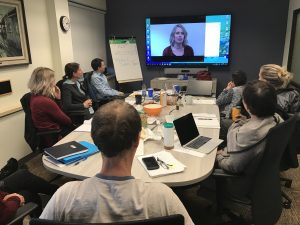For a lot of people taking the stage or speaking in public is a nightmare – but it doesn’t need to be. When I work with clients to present their position or share information it might focus on media interest but essentially it covers all the scenarios that require public speaking.
So my approach is to start by pulling back the curtain on what audiences are hoping you (as the speaker) will deliver. That’s a big step in understanding that your role is not a passive relay switch of info but a trusted and interesting source of valuable intel! This is especially true when the information is complex and they need your help to make it more accessible.
For instance, I was teaching a media relations session to a group of federal government scientists this year and as we practiced on camera interviews one participant confided she was very nervous about being a witness in an upcoming court action that had to do with her field of expertise.
As a group we talked about what could happen, the kind of questions and worst case scenarios to prepare for. This experience turned out to be positive for her – she felt more confident and understood better what she could do to meet the needs of that particular audience. I enjoy coaching and teaching people who may be experts in their field but struggle to articulate and communicate to stakeholders (any audience – from peers to local schoolkids to elected officials). I keep the group size small – 8 or less participants. The workshops runs 1 or 2 days and the evaluations have been averaging 4.7 out of 5 for the last four years. Are you speaking at a conference? Being assigned a public facing role? Expected to provided plain language updates to funding agencies on complex projects? That’s an opportunity to have one on one coaching.
The media training was very helpful. The techniques discussed in the course go a long way to help improve how we communicate. The session was relevant and relaxed!
Media Training Participant, Fisheries and Oceans Canada 2019

